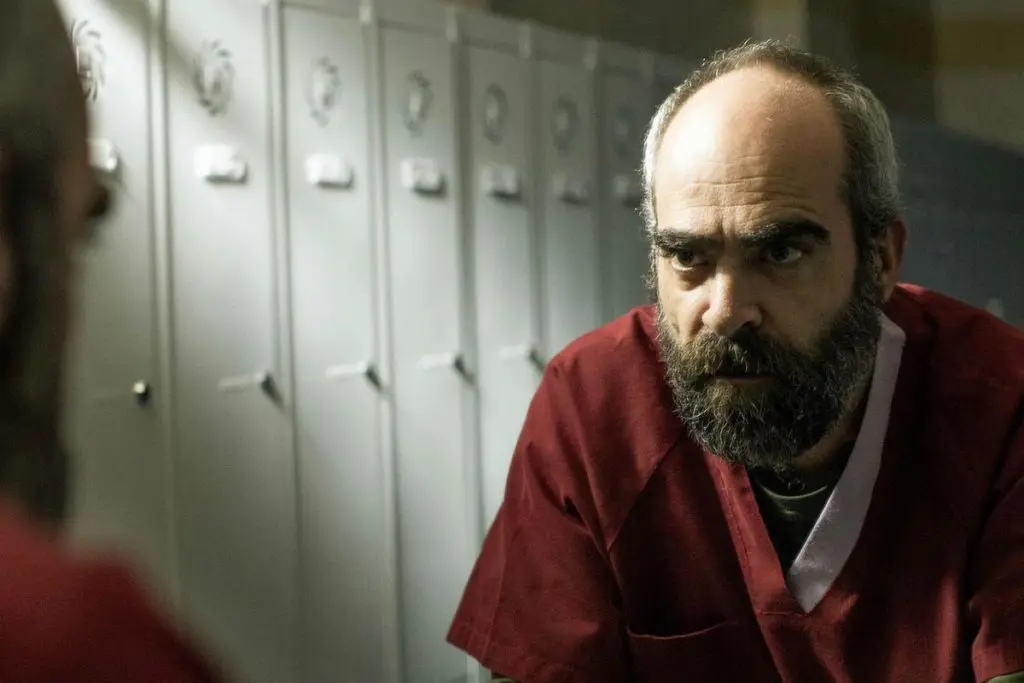Summary
A Shakespearean-quality drama of revenge and family conflict from a quality Spanish pedigree.
When I stepped up to review Eye for an Eye, I did so based on the briefest of descriptions and had no idea I was in for such a treat. A couple of lines referring to “a drug dealer” and “a nurse” could indicate crossed wires, a farce, or a Hitchcockian thriller. Instead of any of those, what Netflix has graciously presented is a slow, taut drama of life and death, family bond and compulsive revenge. Looking back, the story is almost Shakespearean, with drama made up of well-drawn character motivations within a relatively simple plot.
The scenario for this plot is based – like many a Shakespearean play – on a coincidence. They do happen, and it doesn’t matter how plausible they are: therein lies a story. Antonio Paladin (Xan Cejudo), the elderly don of a drug-dealing family is released from prison early due to deteriorating health, and he elects to enjoy some rest in a care home instead of going home to his sons. He is placed in the care of experienced nurse Mario (Luis Tosar), who had not long put his hatred of the cartel behind him when old Antonio showed up.
I’m going to keep going back to the Shakespearean comparison, I’m afraid; due to both the plot and the characters. The character of Mario is given nearly all the focus, with an agonizing conflict between loyalty to his family (new and old) and his professional conscience; and just enough back story to support this conflict.
Tosar (so different to his character in Jaume Balagueró’s Sleep Tight) is utterly plausible as the nurse, in both betraying trust given to him so easily and in neglecting his pregnant wife Julia (Maria Valverde) when he finds himself caught in the middle of the Paladin family crisis. Antonio Paladin appears to be little more than a plot device via his debilitating disease, but the subtle writing hints at real character depth and intellect, which, unfortunately, his two sons Toño (Ismael Martinez, Talk to Her) and Kike (Enric Auquer, Framed) are not blessed with. Classic tragedies tend to be populated with fairly two-dimensional characters who support a central one or two.
The plot of Quien a Hierro Mata is linear, almost to the point of predictability. But this is not a flaw: rather, it lends itself to the inevitability of a dark story: drug addiction and revenge alike are shown to be doomed. The slow pace (supplemented with hypnotic music and careful use of silence at times) reinforces this mood: Antonio receives his medication day after day, the viewer keeps watching, the sons try to change their fate, the story moves forward…
The cast, as you may have noticed, bring a range of well respected Spanish resumes. The crew who, with them, made this film are equally reputable: not least director Paco Plaza ([REC], Veronica), who – with his usual cinematographer Pablo Rosso – is known for a precise and realistic style. Along with them, other crew-members such as co-writer Jorge GuerricaechevarrÍa (Sara’s Notebook, Cell 211, The Warning), and producer Mercedes Gamero (The Body) together bring a showcase of Spanish filmmaking talent to this hard-hitting drama.
Hard-hitting it is; in emotional terms of course, but also with some truly visceral moments (though none of the violence is explicit). Those moments bring the characters closer than ever to truly valuing life and they are presented in such ways that the viewer feels damp, filthy, sweaty along with them. The ending pained me particularly, both in terms of what was on the screen, and the layered implications.
In case it wasn’t apparent, Eye for an Eye has impressed me more as I’ve looked back and written this. I will certainly watch anything with the name Paco Plaza attached… but pair him with any other quality artist and there’s no telling what the result might be. Just don’t watch while eating your dinner.




